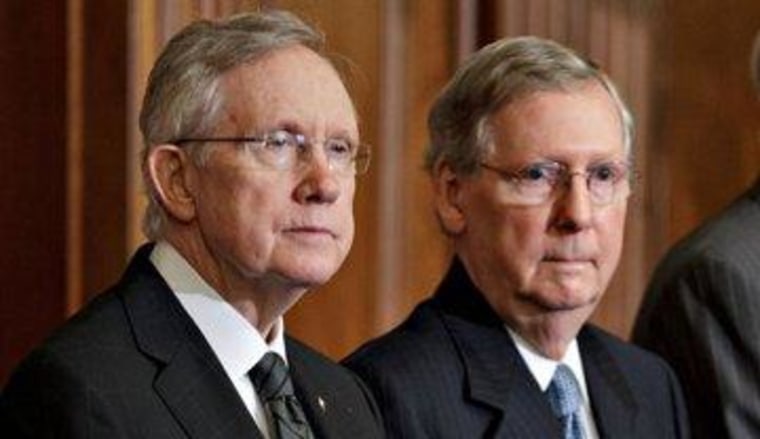In January, Senate Majority Leader Harry Reid (D-Nev.) and Senate Minority Leader Mitch McConnell (R-Ky.) reached a rather laughable agreement on filibuster reform that did not actually reform the filibuster. Reid hoped that the minor changes would help the chamber be marginally more efficient, but it wasn't long before GOP abuses actually made matters worse.
As the year progressed, and the demands for more meaningful reforms grew louder, Reid and his members talked openly about revisiting the issue, but kept pushing off the fight. Today, the dispute is very much back on the front burner.
Majority Leader Harry Reid (D-NV) launched a barn-burner of a speech Thursday on the Senate floor, excoriating Minority Leader Mitch McConnell (R-KY) for continued obstruction when it comes to presidential nominees."Senator McConnell broke his word," Reid said. "The Republican leader has failed to live up to his commitments. He's failed to do what he said he would do -- move nominations by regular order except in extraordinary circumstances. I refuse to unilaterally surrender my right to respond to this breach of faith."
The choice of words is important, because the Senate minority has said in recent weeks that pursuit of the so-called "nuclear option" would be a betrayal -- Reid promised in January that such a sweeping move would effectively be taken off the table by the agreed-upon compromise. What Reid is now saying is that Republicans haven't left him with much of a choice -- McConnell & Co. didn't hold up their end of the bargain.
"I'm not going to wait another month, another few weeks, another year," Reid added, "for Congress to take action on the things we have been doing for almost 240 years."
McConnell, not surprisingly, expressed outrage at the possibility of reforms, and suggested the Senate is functioning relatively well. Reid, he said, is only weighing changes because "the far-left and Big Labor are leaning hard on Democrats."
So, what happens now?
The Majority Leader has been in talks lately with reform-minded Democrats, most notably Sen. Jeff Merkley (D-Ore.), about what, if anything, should be done. We'll know more later today, but Roll Call reports that Reid has an incremental step in mind.
Could senators eliminate filibusters of executive branch nominees without affecting judges or legislation?Procedurally, it might well be possible, but critics of the plan that Senate Majority Leader Harry Reid, D-Nev., appears ready to bring to his caucus Thursday afternoon are already raising that question.
This would certainly be a modest-but-significant step in the right direction -- allowing the minority to filibuster bills and judicial nominees, but not executive branch nominees -- but it's unclear if the change is procedurally possible, whether it has the Democratic votes it needs, and how severe the "nuclear" blowback would be.
Here's what to watch: Senate Democrats will have their weekly meeting today and the leadership will gauge the caucus' attitudes. In the meantime, Reid will file cloture today on a series of nominations, setting up votes for next week, and effectively daring Republicans to block confirmation votes. [Update: Republicans are conceding that EPA nominee Gina McCarthy and Labor Department nominee Tom Perez will be confirmed. This means the real fight will be over the nominees for the Consumer Financial Protection Bureau and the National Labor Relations Board.]
To be sure, some of you are probably thinking, "Reid always seems to back down on this before there's real action," and it's certainly a fair point. But I also think it's fair to say the showdown hasn't progressed to this serious a level -- at least since Democrats reclaiming the majority in 2007.
It's about to get interesting. In fact, Reid has started a process today that will probably make a showdown inevitable early next week. If you've waited for a real showdown on this issue, the train has left the station, and probably can't be called back.
